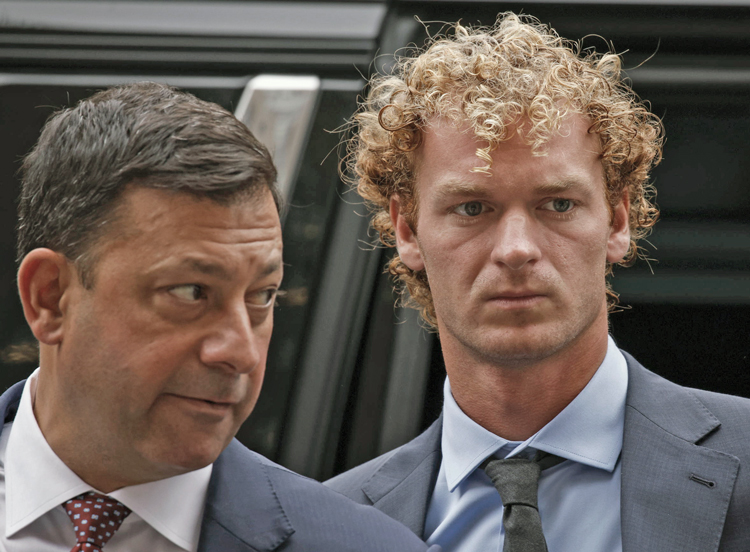NEW YORK — The jury trial of Daniel Penny, 25, a former U.S. Marine and current architectural student charged with the 2023 death of Jordan Neely, opened here Nov. 1.
Penny pled “not guilty” after being indicted on second-degree manslaughter and criminally negligent homicide by Manhattan District Attorney Alvin Bragg’s office. He faces 19 years in prison if convicted on both counts.
Neely, a 30-year-old African American, entered a subway train here May 1, 2023. Once the doors closed, he was erratic and became aggressive, screaming at passengers, “someone is going to die today,” riders told the press. He demanded food and water, and threw his jacket to the ground in a manner, some in the subway car said, they saw was a prelude to violence.
Penny, a passenger, grabbed Neely from behind and restrained him. Both fell to the ground as Neely sought to break free. Two other passengers joined Penny in holding Neely down. Penny reportedly told others to call the police. While passengers kept the train stopped at the next station, it took seven minutes before police arrived.
“I wasn’t trying to injure him,” Penny told detectives who interrogated him. “I was just trying to keep him from hurting anyone else. He was threatening people. … I’m just trying to deescalate the situation.”
Neely had been homeless for more than a decade. Reports from family and police records document his spiral into mental illness, aggravated by drug abuse.
This city’s crises of homelessness, mental illness, rampant illegal drug use and crime have hit working-class neighborhoods hard, especially in African American and Latino areas.
The harsh consequences converge in the giant underground subway system with 472 stations and hundreds of miles of track. Those in need of shelter, sleep or for a handout turn to the subways, as do addicted users of illegal drugs and petty criminals preying on the vulnerable. The murder rate there is up over last year. This reality confronts more than 3 million people who travel to work every day on the subway.
As the trial progresses, politicians and others are attempting to frame the tragedy of Neely’s death as a clear-cut case of racist violence.
Penny is “a white man, a Marine, a trained killer who killed a Black man, a homeless man, and no one cared,” Rachel Cyprien, a real estate broker, told the Free Press as she and other supporters of Black Lives Matter gathered outside the courthouse to demand Penny’s conviction. Congresswoman Alexandria Ocasio-Cortez, City Comptroller Brad Lander, Rev. Al Sharpton and others branded Penny a “murderer” and “vigilante.” Some described Penny’s actions to restrain Jordan Neely as a lynching.
Defense of constitutional rights
Arguments along these lines aim to undermine Penny’s constitutional rights — innocent until proven guilty among them — and railroad him to prison. Penny has denied the charges of racism.
Bragg’s office did not charge Penny with murder, but found lesser charges, nonetheless serious, to press against Penny. “This is not an easy case,” Assistant District Attorney Dafna Yoran told prospective jurors ahead of the trial. “It’s not easy finding someone guilty of killing somebody when you know they didn’t mean it,” she added, attempting to accustom the jury to considering a verdict on the lesser charges.
Defense attorney Thomas Keniff responded, telling the court Neely’s “I will kill” threat on the crowded subway car led Penny to step in to protect other riders. “This is a case about a young man who did for others what we would want someone to do for us.”
Among the first witnesses called by the prosecution were the police officers who arrived at the subway station. Undermining the prosecutor’s assertions, officers testified and bodycam videos showed they found Neely unconscious with a pulse. The officers administered chest compressions, CPR and Narcan, an opioid antidote, to try to revive him. But they testified they refused to give mouth-to-mouth resuscitation, saying Neely was “dirty” and could have had AIDS.
Subway passengers Ivette Rosario, 19, and Juan Alberto Vasquez, 59, were called by the prosecution. Both used their phones to video Neely being restrained by Penny. The prosecution asserts the videos verify Penny killed Neely.
Rosario said Neely’s tone was angry, nothing like she’s heard before in previous incidents on the subway. “I was very nervous,” she told the court. “I thought I was going to pass out.”
Vasquez, a freelance journalist, testified that Neely’s tone was “violent and desperate.” On cross-examination prompting objections by prosecutors, Penny’s defense attorneys noted Vasquez had at the time told a detective worries crossed his mind about a subway shooting that had occurred during rush hour in 2022 when a man wounded 10 passengers.
Since his indictment, Penny has received tens of thousands of individual contributions amounting to $3.1 million to cover his legal defense expenses. The trial is expected to last at least five weeks.


